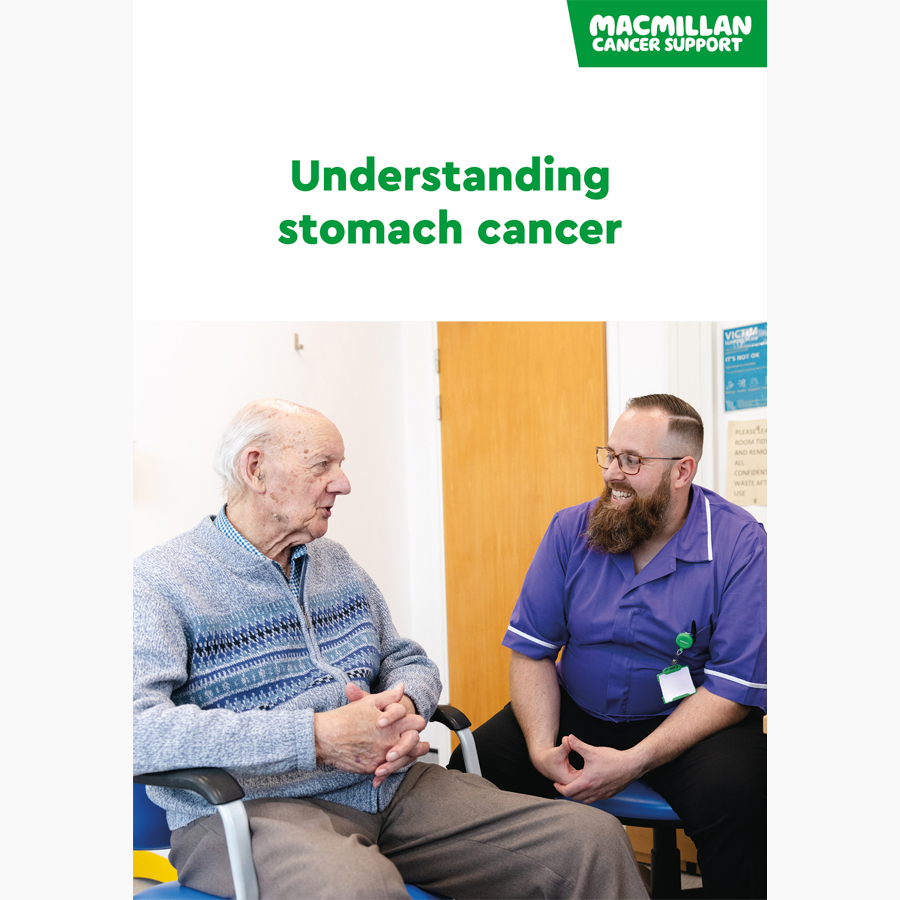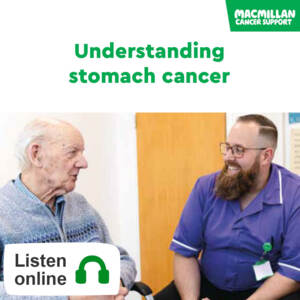What is stomach cancer?
The stomach is a stretchy, muscular bag that stores food and helps break it down through digestion. It is in the upper left-hand side of the tummy area (abdomen).
Cancer can develop in the stomach. This is called stomach cancer or sometimes gastric cancer. Stomach cancer may spread to other parts of the body and can spread to lymph nodes close to the stomach.
The risk of developing stomach cancer increases as you get older. Over half of people (50%) diagnosed with stomach cancer are aged 75 or older.
Booklets and resources
Types of stomach cancer
Knowing the type of stomach cancer helps your cancer doctor plan your treatment.
This information is about adenocarcinoma, which is the most common type of stomach cancer. More than 9 in 10 stomach cancers (95%) are adenocarcinoma. Adenocarcinoma starts in the glandular cells of the stomach lining.
Less common cancers that can start in the stomach include:
- soft tissue sarcomas, including gastrointestinal stromal tumours (GISTs)
- lymphomas, such as mucosa-associated lymphoid tissue (MALT) lymphomas
- neuroendocrine tumours (also known as NETs).
The tests and treatments for these types of stomach cancer are different from the ones we describe in this information.
Related pages
Symptoms of stomach cancer
Some symptoms of early stomach cancer are also symptoms of other common stomach problems. But it is important to get them checked by your GP. Common symptoms of stomach cancer include:
Common symptoms can include:
- heartburn or indigestion that does not go away
- pain or discomfort in tummy (abdomen)
- loss of appetite
If you are worried about stomach cancer we have more information about the signs and symptoms of stomach cancer.
Related pages
Causes of stomach cancer
Certain things can increase the chance of developing stomach cancer. These are called risk factors. Having a risk factor does not mean you will definitely get stomach cancer. Or if you do not have any risk factors, you may still be diagnosed with stomach cancer. We do not yet know why only some people who have risk factors develop stomach cancer.
Stomach cancer is not infectious and cannot be passed from one person to another.
We have more information about the causes and risk factors of stomach cancer.
Diagnosis of stomach cancer
You usually start by meeting your GP. They will ask about your symptoms and examine you. You may have blood tests to check your general health. If your GP is not sure what the problem is, or thinks you may have cancer, they will refer you to hospital for a test called an endoscopy.
If your GP thinks you may have cancer, they will make an urgent referral for an appointment. This means your GP is asking for a specialist appointment for you within 2 weeks or as soon as the clinic can arrange it.
Tests for stomach cancer
The main test used to diagnose stomach cancer is an endoscopy. An endoscopy is a test to look at the lining of your food pipe (oesophagus), stomach and duodenum (the first part of your small bowel). Endoscopies can also be used to give treatment.
We have more detailed information about how stomach cancer is diagnosed. This includes information about what happens when you see your GP, tests you may have if you cannot have an endoscopy and more information about further tests.
Waiting for test results can be a difficult time, we have more information that can help.
Related pages
Staging and grading of stomach cancer
Your cancer doctor needs information about the cancer to advise you on the best treatment for you. This includes the cancer’s:
- stage, which describes the cancer and whether it has spread
- grade, which gives an idea of how quickly the cancer might grow and spread.
Your cancer doctor can use the results of your tests to try to identify the stage of the cancer. They will do this before your treatment is planned to help decide the best treatment for you. But they may not know the exact stage of the cancer until it has been removed with surgery.
We have more information about staging and grading.
Treatment for stomach cancer
A team of specialists will meet to discuss the best possible treatment options for you. This is called a multidisciplinary team (MDT).
Your cancer doctor or specialist nurse will explain the different treatments and their side effects. They will also talk to you about things to consider when making treatment decisions.
Your treatment for stomach cancer depends on:
- the stage of the cancer
- your general health
- your personal choices.
The main treatments for stomach cancer are:
-
Surgery
Surgery can be used to remove the cancer or relieve the symptoms of stomach cancer that has spread.
-
Chemotherapy
Chemotherapy uses anti-cancer drugs to destroy cancer cells. It can be given on its own or in combination with other treatments.
Other treatments may include:
-
Radiotherapy
Radiotherapy uses high-energy rays to treat cancer. It destroys cancer cells in the area where the radiotherapy is given. It can be given with chemotherapy after surgery to reduce the risk of cancer coming back or to help symptoms, such as bleeding from the stomach.
-
Targeted therapy
Sometimes a targeted therapy drug called trastuzumab is given with chemotherapy to treat advanced stomach cancer. Targeted therapy drugs target something in or around the cancer cell that is helping it grow and survive.
-
Immunotherapy
Currently immunotherapy is not commonly used to treat stomach cancer. Nivolumab or pembrolizumab are sometimes used. You may be offered immunotherapy as part of a clinical trial.
The treatments can be used alone or in combination with each other. You may also have treatments as part of a clinical trial.
We have more information about treatment for stomach cancer.
Related pages
After stomach cancer treatment
After your treatment has finished, you will have regular follow-up appointments. You will usually talk with someone from your healthcare team at the appointment. This may be your surgeon, cancer doctor, specialist nurse or another health professional.
If you have any problems or new symptoms between appointments, tell your cancer doctor or specialist nurse as soon as possible.
You may get anxious between appointments. This is natural. It may help to get support from family, friends or a support organisation.
Macmillan is also here to support you. If you would like to talk, you can:
- Call the Macmillan Support Line for free on 0808 808 00 00.
- Chat to our specialists online.
- Visit our stomach cancer forum to talk with people who have been affected by stomach cancer, share your experience, and ask an expert your questions.
Eating after treatment for stomach cancer
It can take a few months to recover from treatment for stomach cancer. You will usually have a soft diet while you are still in hospital, and normally be advised to keep to this diet for a few weeks. It will help to eat small amounts more often. Gradually, you will be able to start eating solid foods again. It may take up to a year to adjust to the changes in your digestive system.
After an operation to remove the stomach or part of the oesophagus, food can travel more quickly through the digestive system. This can cause symptoms called dumping syndrome.
We have more information and advice about eating after treatment for stomach cancer and about dumping syndrome.
Well-being and recovery
Even if you already have a healthy lifestyle, you may choose to make some positive lifestyle changes after treatment.
Making small changes such as keeping active can improve your health and wellbeing and help your body recover.
Related pages
About our information
This information has been written, revised and edited by Macmillan Cancer Support’s Cancer Information Development team. It has been reviewed by expert medical and health professionals and people living with cancer.
-
References
Below is a sample of the sources used in our stomach cancer information. If you would like more information about the sources we use, please contact us at informationproductionteam@macmillan.org.uk
Lordick F, Carneiro S, Cascinu T, Fleitas K, Haustermans G, Piessen A, et al. Gastric cancer: ESMO Clinical Practice Guideline for diagnosis, treatment and follow-up. Annals of Oncology. 2022;33(10): 1005–1020. Available from www.doi.org/10.1016/j.annonc.2022.07.004 [accessed July 2023].
National Institute for Care and Health Excellence. Oesophago-gastric cancer: assessment and management in adults NICE guideline [NG83]. 2018. Available from www.nice.org.uk/guidance/ng83 [accessed July 2023].
Dr Chris Jones
Reviewer
Speciality Registrar in Clinical Oncologist and Clinical Lecturer in Clinical Oncology
Date reviewed

Our cancer information meets the PIF TICK quality mark.
This means it is easy to use, up-to-date and based on the latest evidence. Learn more about how we produce our information.
The language we use
We want everyone affected by cancer to feel our information is written for them.
We want our information to be as clear as possible. To do this, we try to:
- use plain English
- explain medical words
- use short sentences
- use illustrations to explain text
- structure the information clearly
- make sure important points are clear.
We use gender-inclusive language and talk to our readers as ‘you’ so that everyone feels included. Where clinically necessary we use the terms ‘men’ and ‘women’ or ‘male’ and ‘female’. For example, we do so when talking about parts of the body or mentioning statistics or research about who is affected.
You can read more about how we produce our information here.
How we can help





